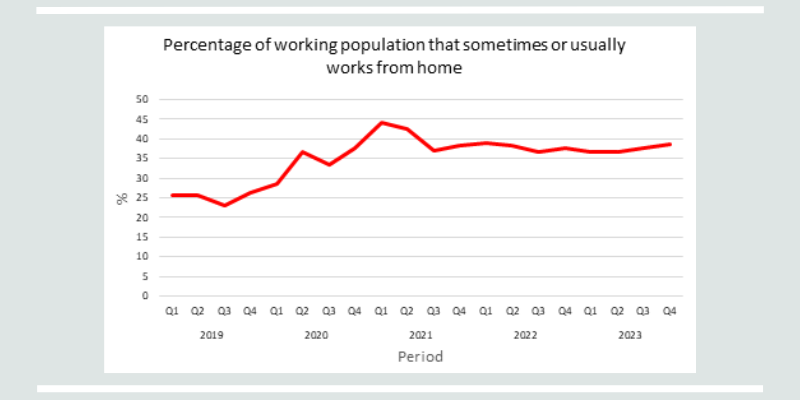Now that we have taken the first steps into 2024, we cast a glance at future developments within the field of teleworking. In a world where flexibility and a good work-life balance are increasingly central, we examine the changes we can expect within hybrid working.
Teleworking, once a special circumstance, has rapidly transformed itself into an integral part of modern working culture. A crucial question within this domain is how organisations can develop a telework policy in a sustainable way, as well as how to ensure that employees respect the designed guidelines.
In other words, the initially rather casual attitude of organisations is gradually evolving into a more structured approach. The initial mindset of "Feel free to work from home, find out for yourself where you are most productive, we'll let it unfold" has given way to a more focused approach.
In this blog, we outline the current teleworking figures for Belgium and take a closer look at the expectations of both employees and employers.
Some figures on teleworking
To gain insight into the current figures around teleworking, we used statistical data from Statbel, the Belgian statistics office. The collected data, shown in the graph below, shed light on the percentage of working people who telework in an occasional or regular way.
The graph shows a general upward trend in the share of the population that sometimes or always works from home. Notable is the significant increase in 2020, with COVID-19 as an explanatory factor. In 2021, organisations continue to use telework to ensure continuity and the percentage of teleworkers remains high. In 2022 and 2023, we see a moderate decrease from its peak in 2021. A possible, explanatory factor is the fact that a new balance between home and office work is being sought, with organisations actively looking for optimisations. Overall, interest in teleworking remains higher than the starting point of the measurements (2019).
The fact that we find an overarching upward trend in the data confirms that teleworking has become an enduring characteristic of our contemporary working environment.

Different expectations
Comparing views on teleworking between employees and employers, it appears that there is no complete agreement. In general, employees expect more and more flexibility, while employers nowadays are more inclined to restrict this flexibility:
Belgian employees show a strong preference for hybrid working. Various reasons are put forward for this. Avoiding daily traffic jams, a better work-life balance and being able to better combine work and family life are the three main motivators for teleworking. Concentration and distraction also play a role. Employees report that they are less disturbed during their work when working from home.
Nevertheless, employees also recognise the value of face-to-face encounters in the workplace. Working from the office creates a higher degree of creativity and spontaneity. This creates the challenge of finding the right balance between the comfort of working from home and the benefits of an office environment.
While organisations still want to meet the growing need for flexibility among their employees, some doubts arise among employers and managers. The initially relaxed attitude towards teleworking has given way to stricter demands from companies. Just think of organisations like Disney, Meta, JPMorgan and Zoom which recently indicated their intention to limit their telework policies. Elon Musk even went so far as to describe teleworking as 'Work from home bullshit', advocating for working within the company context as the optimal form of collaboration.
Even within recruitment and selection processes, there appear to be some biases around teleworkers. A recent study by the University of Ghent found that explicitly expressing a desire for teleworking during a job interview can reduce job prospects. Recruiters still seem to prefer traditional availability and dedication. This also shows that organisations still want to stick to the more traditional way of working to some extent.
Harmonising both perspectives
Within today's telecommuting culture, companies are striving to balance the operational goals of the company with the individual needs of their employees. An evolution towards a new balance between remote work and physical presence in the workplace is central to this chase.
Companies are already actively experimenting with different models. Consider Smucker's notable core weeks concept, which allocates specific weeks to office work, creating a dynamic blend of physical and virtual presence.
Such initiatives show that organisations are still open to meeting employees' preferences. However, concerns remain about excessive demand for flexibility and the potential negative impacts on productivity.
To find effective solutions, it is crucial that organisations remain committed to open communication with their employees. Clear guidelines and a flexible yet structured telework policy are key to successful harmonisation. This with the aim of making hybrid working a sustainable and productive part of the corporate culture!

Sources:
We werken per week 1,5 dagen van thuis, maar willen eigenlijk 2,4. (n.d.). Bright Plus. https://www.brightplus.be/nl/nieuws/we-werken-per-week-1-5-dagen-van-thuis-maar-willen-eigenlijk-2-4
Thuiswerken | Statbel. (n.d.). https://statbel.fgov.be/nl/themas/werk-opleiding/arbeidsmarkt/thuiswerken#:~:text=Thuiswerk%20is%20een%20blijver&text=De%20coronacrisis%20heeft%20het%20thuiswerken,lange%20termijn%20zijn%20duidelijk%20zichtbaar.
Werken op kantoor: denk in weken, niet in dagen. (2023, October 13). De Tijd. https://www.tijd.be/opinie/column/werken-op-kantoor-denk-in-weken-niet-in-dagen/10499040.html#:~:text=Sinds%20de%20pandemie%20is%20thuiswerk,het%20met%20jullie%20thuiswerkbeleid%3F%27
Nws, V. (2023, August 8). Videochatbedrijf Zoom haalt eigen werknemers terug naar kantoor. vrtnws.be. https://www.vrt.be/vrtnws/nl/2023/08/08/zoom-roept-werknemers-terug/#:~:text=Werknemers%20die%20op%20minder%20dan,van%20thuis%20uit%20kunnen%20werken.
Sioen, L. (2023, November 16). U wilt telewerken? Dat zegt u beter niet op een sollicitatiegesprek. De Standaard. https://www.standaard.be/cnt/dmf20231115_97722686#:~:text=Wie%20bij%20een%20sollicitatiegesprek%20aangeeft,kansen%20op%20de%20job%20slinken.&text=Tijdens%20corona%20werd%20het%20een,per%20week%20thuis%20kunnen%20werken.
Bonifacio, R. (2023, March 6). Telewerken: Voordelen, Nadelen en Beleid - Shiftbase. Shiftbase. https://www.shiftbase.com/nl/woordenboek/telewerken

